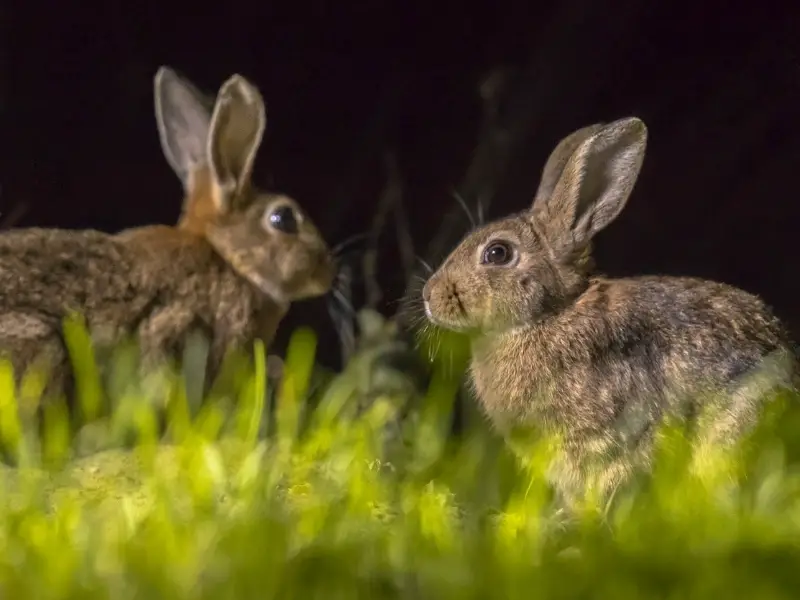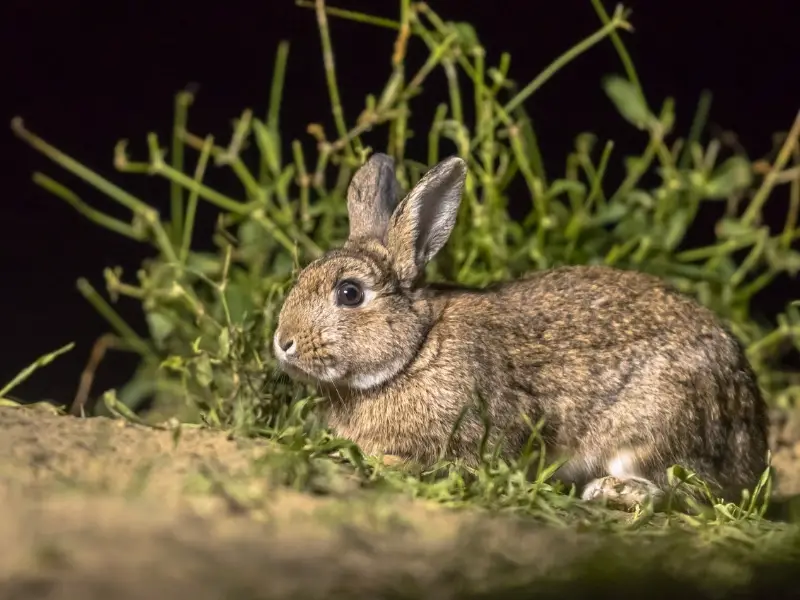Your pet bunny is most active when the sun rises—at dawn—and when the sun goes down—at dusk. It may also sleep most of the daylight hours away.
What about during the hours of darkness? Are they awake and active then too while you slumber away peacefully? Or do they also sleep some more then?
Can a rabbit see in the dark? And do they have good vision?
Technically, rabbits can see in the dark but not in complete darkness. Rabbits are crepuscular, meaning they are most alert and active when it is dusk and dawn. The light conditions are low at these times, and so wild rabbits have good eyesight in dim light to be able to forage and survive in the wild.
Moreover, rabbits are prey animals and need to be able to see and hear predators that are out hunting at dusk and dawn.
Keen to learn more about a rabbit’s vision? Let’s take a look.
How Do a Rabbit’s Eyes Work?
A rabbit’s eyes are situated on the sides of its head. As such, they nearly have a full 360-degree field of vision. There is only one blind spot: right in the middle of their vision.
The biggest advantage of this lateral eyesight is that bunnies can more easily identify and spot any potential danger in the wild.
It won’t be easy for a predator to sneak up on a bunny as they can spot the predator from any angle. When a rabbit spots a potential threat, it can act by thumping to warn off a predator or run away to safety.
Compared to a human’s vision, that of a rabbit is more acute as they can detect movement faster and also see farther. A bunny’s eyes are also more sensitive to light, up to 8 times more than our visual sensitivity. This is what helps a rabbit see so clearly when the light is low.
Can a Rabbit see Color?
On the topic of rabbit eyes, you may also wonder if rabbits are colorblind or if they see in color.
A bunny cannot see the same color spectrum as what we can see, so they are partially colorblind. They mostly see in shades of yellow, blue, and green (so you might look like a little alien to your fluffy long-eared friend).
Humans in prehistoric times needed to be able to see more colors to differentiate between poisonous food and those that are safe to consume. Bunnies, on the other hand, mostly eat hay and leafy greens, and being able to see in blues, greens, and yellows, then works perfectly for them.
How Far Can Rabbits See?
To help aid their survival in the wild, rabbits are far-sighted. This helps it spot predators from far away.
A domesticated rabbit doesn’t necessarily need to worry about being able to see far away; however, there are predators close to home that could be a threat. In general, your property walls or fence will keep potential threats out.
Your rabbit will still be able to see far away and may seem skittish (for no reason you can pinpoint). For example, while out in your garden with you keeping an eye on your bunny, it may see an airplane. Bunny doesn’t know what an airplane is and that it isn’t going to harm it, so bunny scampers to its hutch.
With the far-sightedness, your fluff-ball may be clumsy when things are close in range since it lacks depth perception and its vision is somewhat blurry when things are up-close. So you may find that your rabbit knocks things over easily or trips over the food bowl.
When Are Rabbits the Most Active?

As crepuscular animals, rabbits are most awake, alert, and active at dawn and dusk.
Why at these times? Because most predators are either more active during the day (diurnal) or at night (nocturnal).
Rabbits thus use this magical in-between time to gather their food or roam around since dusk and dawn should be safer. This is also the time when they socialize and clean their burrows.
Are Rabbits Nocturnal?
No, rabbits are not nocturnal, or active, alert, and awake, during the night.
In the wild, nighttime hours are dangerous for rabbits because of the nocturnal predators that search for their next meal.
Do Rabbits Like to Be in the Dark?
Being in the dark won’t scare a rabbit; however, if there are strange smells or noises, your bunny will be spooked regardless of the time of day.
A rabbit scares easily, so you want to ensure that there are no loud noises or scents that can be scary during the day or night especially since bunnies can’t see in pitch darkness.
Should I Turn the Light off for My Rabbit at Night?
This depends on your pet rabbit. Some bunnies sleep through the night, then there is no reason to leave the light on. Other rabbits may be more active at night if they sleep during the day, and then you can leave a light on dim for them so they can move around safely in their hutch.
The safest bet if you are not sure is to leave a light on at low. However, your bunny also needs light and darkness to help its body clock regulate so it knows when to sleep when to shed fur, and so on. A dark-ish area, like a burrow, will also help it feel safe.
While it may not be the most convenient, the low light should be placed at some distance away from the hutch so your bunny can sleep in darkness, emulating the burrow underground where wild rabbits sleep.
You may need to train your bunny to accept pitch darkness at night. This will require a lot of patience but it is possible.
Conclusion
Rabbits are most alert and awake at dusk and dawn. They either sleep during the day or night, but they could be mildly active during the other parts of the day.
They are not nocturnal animals as some predators hunt during the night. Other predators hunt during the day. Thus, dusk and dawn are the safest time of day for a wild rabbit to get around and forage for food.
During sunrise and sunset, you’ll find that your bunny wants to play or exercise or wants to eat.

